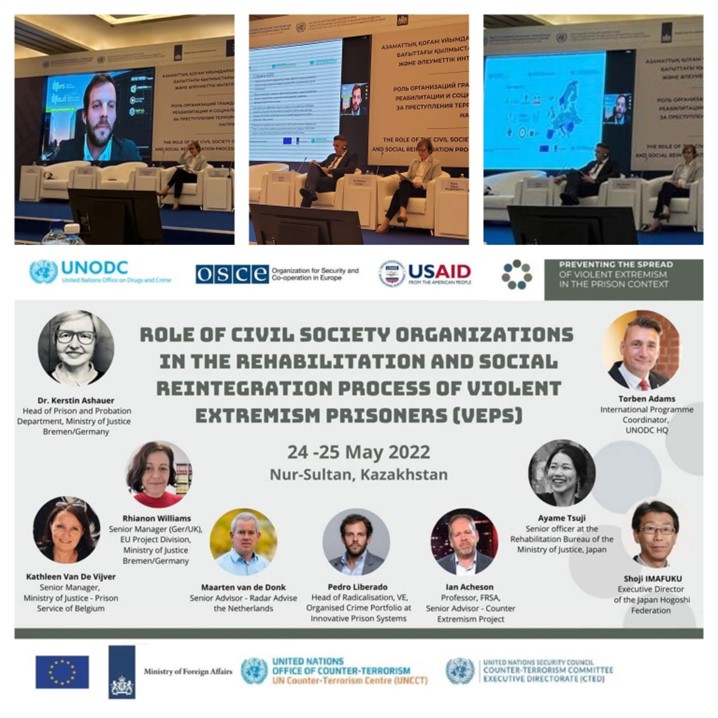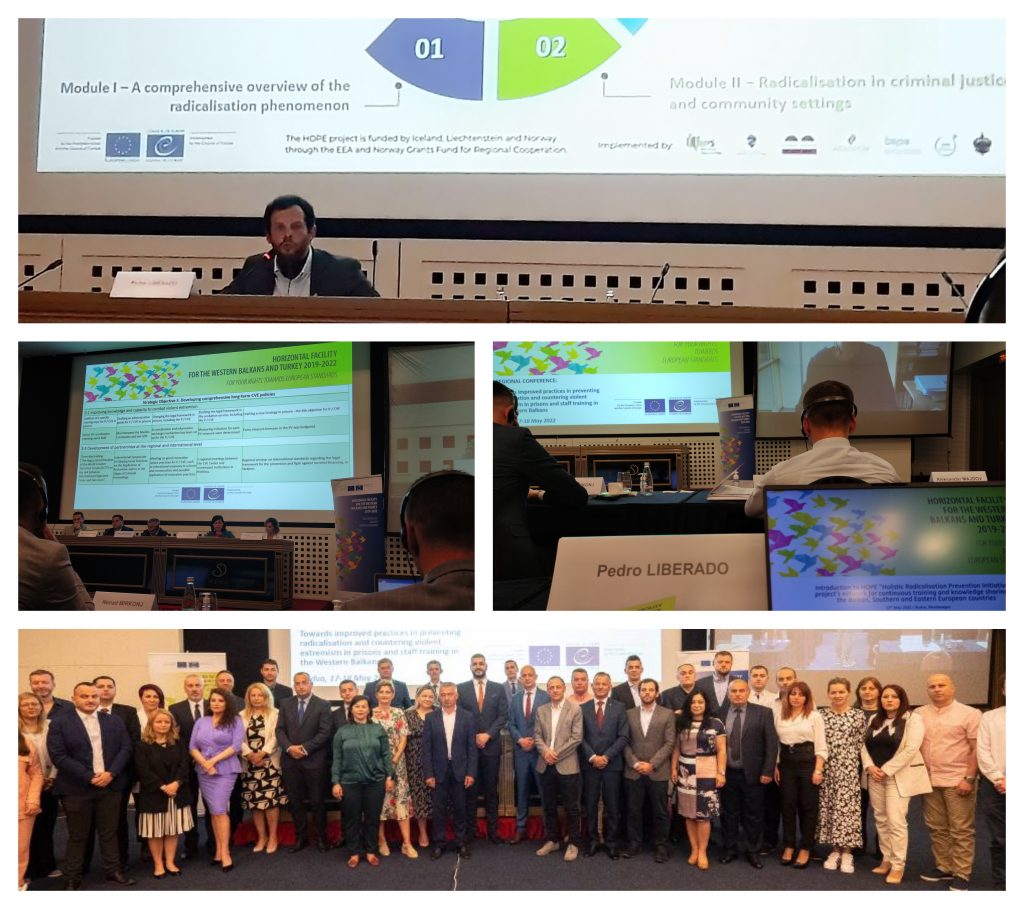Promoting a holistic model of radicalisation prevention and a European expert network next to high-level stakeholders.
Cooperation is a key concept in successfully addressing the radicalisation and violent extremism threat. A holistic approach to the problem involves cooperation between all institutional and community agents working with those at risk of radicalisation or who have already been radicalised.
Knowledge sharing and the wide-ranging implementation of standardised and evidence-based strategies also allow for a solid and enhanced progression towards better results in radicalisation prevention.
While the Balkan, Southern, and Eastern European countries are the geographical focus of the HOPE project for their particular exposure to these threats, extremism is a global problem. It can sprout from any radical ideology or belief and take many forms.
That’s why recently, the HOPE project – Holistic Radicalisation Prevention Initiative was invited to take the stage to present its goals and ongoing work at two major international events.
HOPE's approach featured at UNODC Forum on violent extremism prevention in prisons
The United Nations Office on Drugs and Crime (UNODC) organised a forum in Nur-Sultan (Kazakhstan) focusing on “The Role of Civil Society Organizations in rehabilitation and social reintegration of violent extremist prisoners”.
This high-level event sought to share international best practices and provide a better understanding of the ‘Multi-Agency Cooperation Approach’ to P/CVE in prison contexts.
In the audience were representatives of relevant government agencies, training institutions, academia, and civil society organisations. Among the speakers were international experts from Belgium, Germany, Japan, Norway, the Netherlands, and the UK.

IPS’ Chief Research Officer and coordinator of the Radicalisation, Violent Extremism and Violent Crime portfolio, Pedro Liberado, took on this challenge and presented the project’s approach. He highlighted that the European initiative is committed to enhancing cooperation between governmental bodies and civil society organisations to ensure the prison-exit continuum and successful rehabilitation of violent extremist prisoners (VEPs).
HOPE represented in a gathering of best practices and staff training in the Western Balkans
Also in May, the HOPE project had the opportunity to discuss the current state-of-play of P/CVE initiatives in the Western Balkans at a Council of Europe’s (CoE) Regional Conference in Budva, Montenegro.
Represented by Pedro Liberado, the initiative was introduced to over fifty participants, including experts and researchers, Council of Europe representatives, and prominent practitioners from prison and probation settings of the Western Balkans.
In the audience were representatives of relevant government agencies, training institutions, academia, and civil society organisations. Among the speakers were international experts from Belgium, Germany, Japan, Norway, the Netherlands, and the UK.

Other important themes with a focus on the Western Balkans reality were on the table at this event. The discussion broached the topics of practitioners’ training needs, Foreign Terrorist Fighters and their families, challenges in the identification of radicalisation, and risk and needs assessment, among others.
HOPE will continue seeking to engage relevant stakeholders in preventing and countering violent extremism through a holistic lens. This European initiative is developing a network for continuous training and knowledge sharing in the Balkan, Southern, and Eastern European countries. The goal is to increase the knowledge base and cooperation between stakeholders to develop and implement successful P/CVE practices.
One way to get involved is by joining HOPE’s Radicalisation Network. In this online hub, members can stay abreast of all project initiatives, access hundreds of relevant resources, and network with dozens of P/CVE experts from over 40 organisations worldwide.
Know more about this project

DIGIDEM
Fostering Digital Democracy and Citizenship in Higher Education
HOPE is led by IPS_Innovative Prison Systems (Portugal) in partnership with organisations from several countries, namely the University College of Norwegian Correctional Service (Norway), Agenfor International Foundation (Italy), the Euro-Arab Foundation for Higher Studies (Spain), the Bulgarian Association for Policy Evaluation (Bulgaria), the Bulgarian General Directorate “Execution of Sentences” (Bulgaria), the Bucharest-Jilava Penitentiary (Romania), the Helsinki Committee for Human Rights in Serbia (Serbia) and the Slovenian Probation Administration (Slovenia).
For more information about the HOPE project, please visit: www.hope-radproject.org
Related projects

CEDAR
Continuing Education Against Radicalisation

COOPERHATE
Delivering a comprehensive approach to preventing, reporting, investigating and prosecuting hate crime and hate speech-related incidents in Portugal

EUTEx
Developing a European framework for disengagement and reintegration of extremist offenders and radicalised individuals in prison

FUTURE-ART
Sentinels of the Future: Together to Eradicate Human Trafficking

IN2PREV
Law enforcement and community cooperation and training approach to prevent radicalisation by ensuring refugees’ successful inclusion

INDEED
Strengthening a comprehensive approach to preventing and counteracting radicalisation based on a universal evidence-based model for evaluation of radicalisation prevention and mitigation

INTEGRA
Integrated Community, Probation and Prison Services Radicalisation Prevention Approach

KOBAN
Identifying future capabilities for Community Policing

MIRAD
Multi-Ideological Radicalisation Assessment towards Disengagement

PARTES
Participatory Approaches to Protecting Places of Worship
Related news

IN2PREV Final Conference highlights cross-sector collaboration for refugee inclusion and radicalisation prevention
Read More »
Standing united against hate: A national effort to prevent and tackle hate crime and hate speech in Portugal
Read More »
New IPS-led initiative unites efforts to protect religious communities, schools, and places of worship
Read More »
IPS contributes to shaping EU’s future agenda on radicalisation prevention at Brussels Town Hall meeting
Read More »
Advancing rehabilitation and countering contemporary extremist threats: IPS at the EU Knowledge Hub on Prevention of Radicalisation Thematic Panels
Read More »



